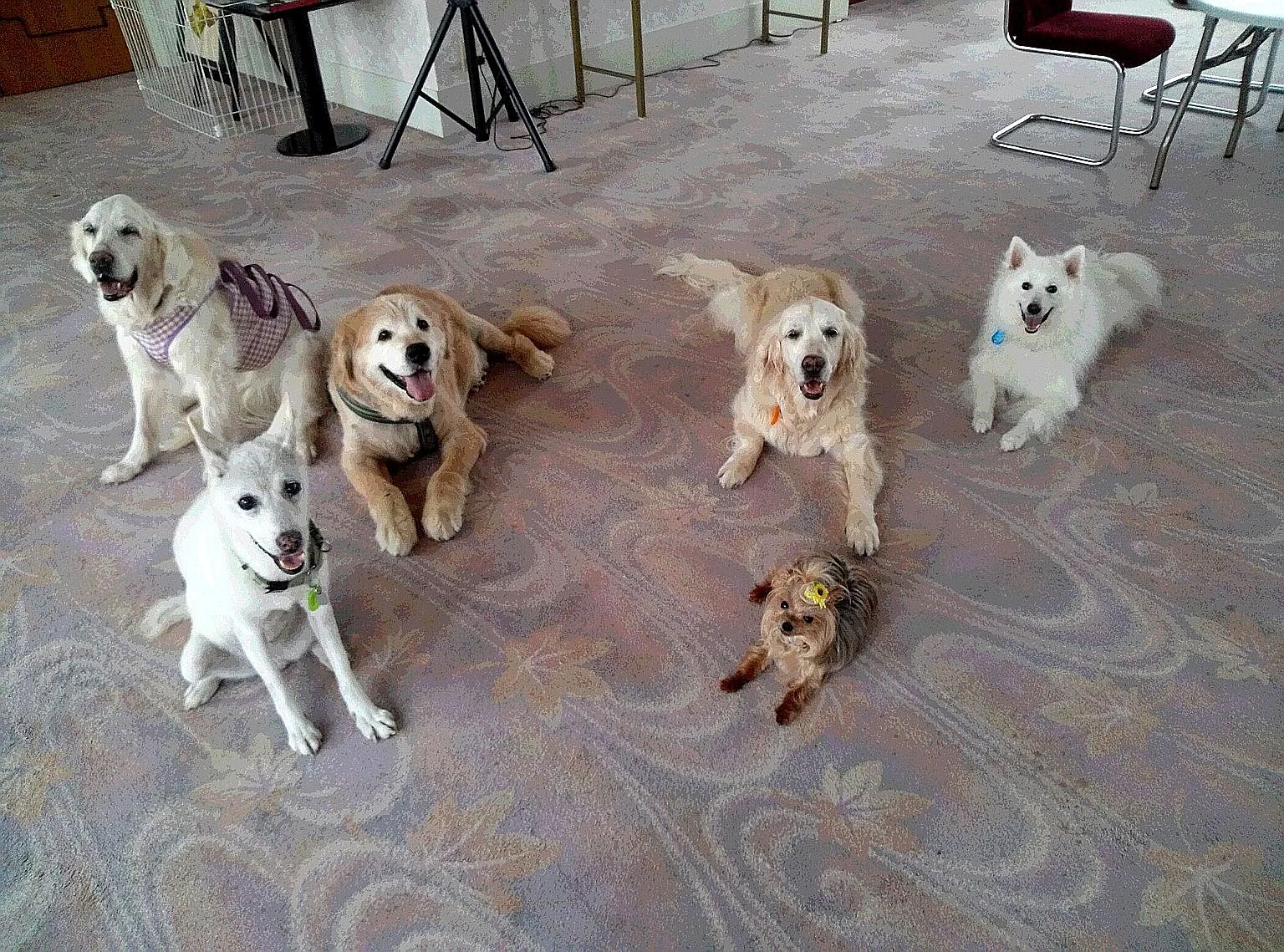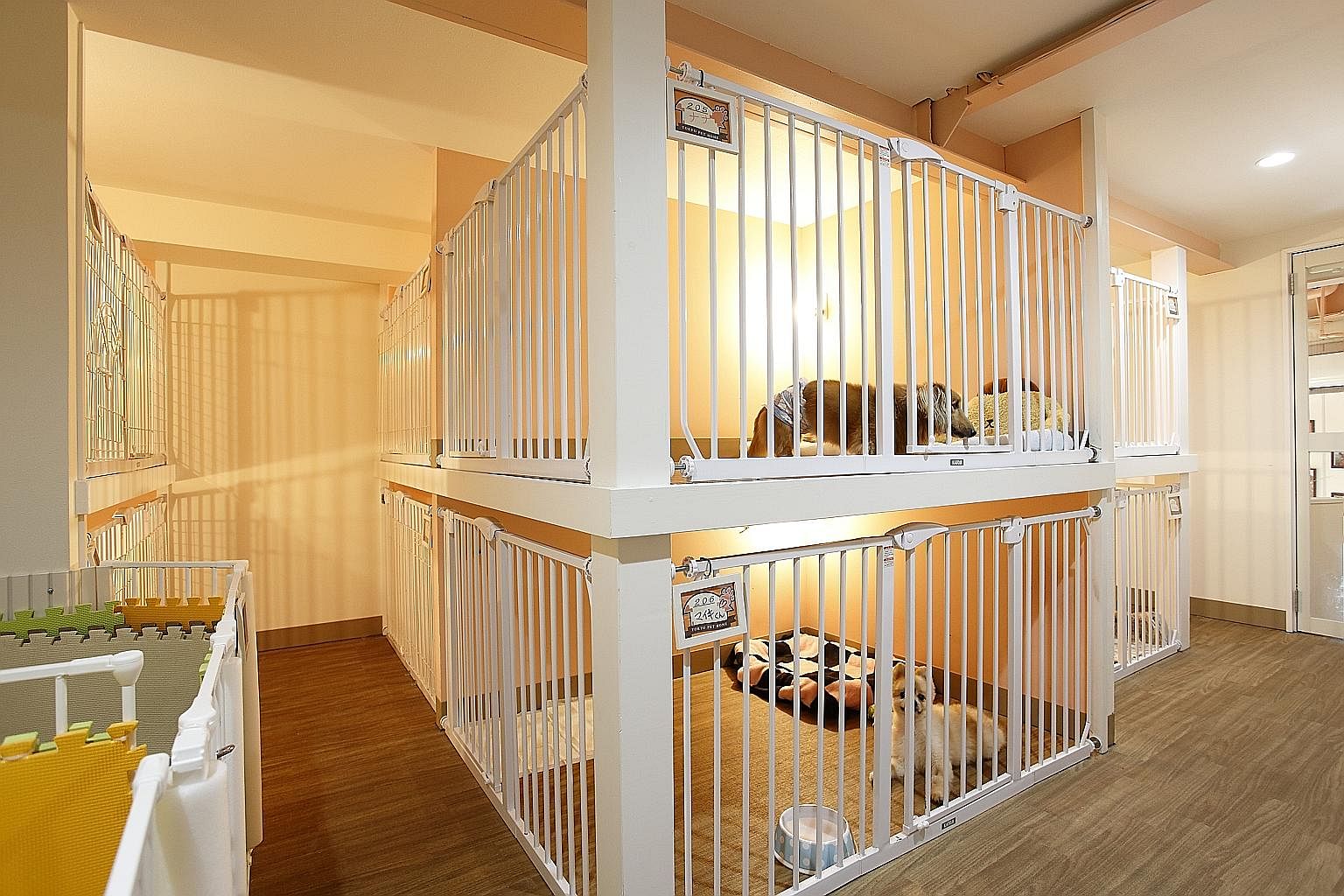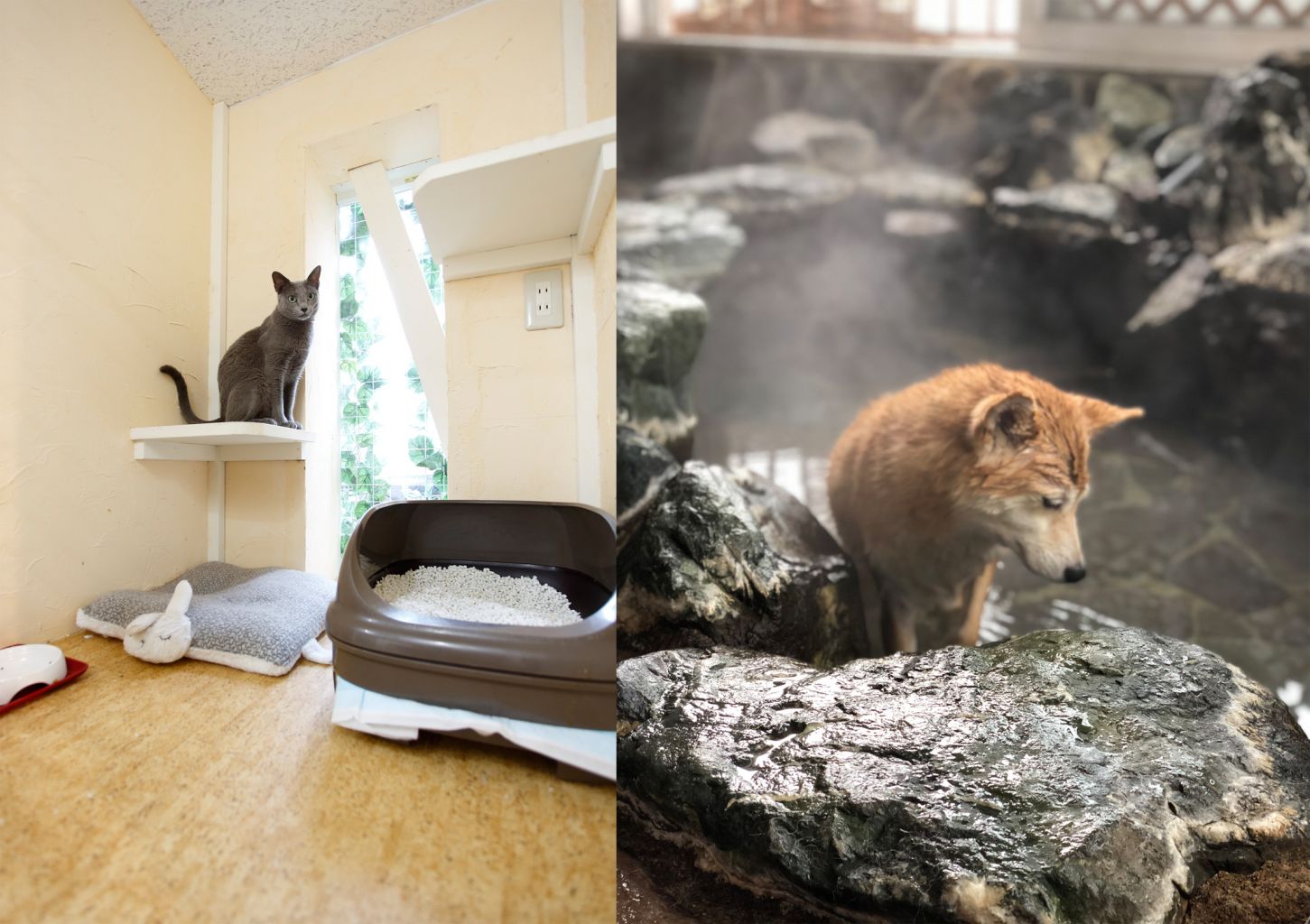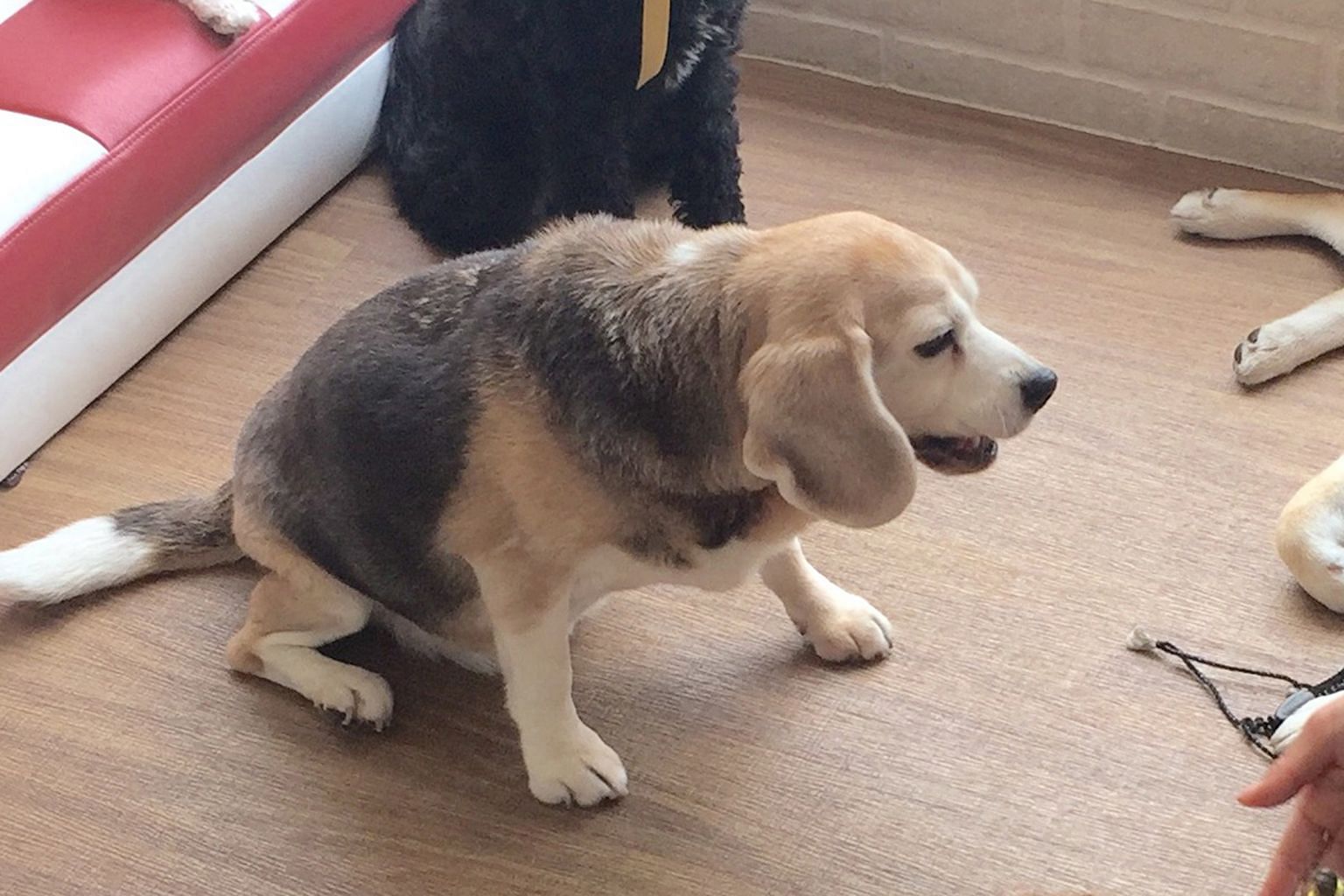Hot springs, meals served in private rooms, therapeutic massages and chauffeur services - this may sound like what's available at a Japanese ryokan (inn). But you would be barking up the wrong tree.
It is an example of the care on offer at nursing homes for pets. Such homes for ageing furry friends are springing up across the country.
"The reality is that good nutrition and better healthcare are extending the lifespan of not just Japan's elderly folk, but their pets as well," said Mr Akira Watanabe of Tokyo Pet Home, set up in 2015.
Pets are outliving their owners, or else ageing owners are losing the ability to care for their animal companions.
According to an annual survey by the Tokyo Pet Food Association, the average lifespan of dogs and cats has reached a record high of 14.2 calendar years for the former and 15.3 years for the latter - compared with an average of 3.7 years for dogs in 1980.
Of the 10 million dogs and cats in Japan, around six in 10 dogs and half the cats have reached middle age in animal years.
As of last October, more than 560 dogs and cats were enrolled in pet homes, up from just over 200 in March 2016, according to pet care website Rouken Care.


The number of pet homes has increased rapidly in the past three to four years to around 150 now, going by the homes registered on the site.
ENDING UP IN PET HOMES
At Tokyo Pet Home, around 40 per cent of the cases it handles are pets in need of extra care because of age or illness. The remainder are there because their owners are in poor health or unable to cope with caring for them.


The Watanabes have eight dogs in full-time care - of which two are bedridden - and 22 cats. The pets have a room of their own so their owners can spend private time with them during visits.
Mr Tatsuya Nakashima, meanwhile, started a dog nursing home in Saga Prefecture, southern Japan, after his dog died of old age.
"I wanted elderly dogs to be able to spend their last days in peace after a lifetime of devotion to their masters," he said.
He has 11 dogs under his care. One of them, Tora, belongs to Madam Naoko Matsubara, a 73-year-old widow. She found it difficult to care for Tora after it started showing signs of dementia and had trouble seeing. Tora's barking also kept her awake at night. Madam Matsubara visits her pet once a week.
"He looks better than when under my care, I feel sad without him - but also relieved," she said.
DISASTER DISPLACEMENT
Not all pets are in these pet homes because of old age or health conditions.
One factor that has driven the demand for pet homes in Japan is the phenomenon of "disaster victim pets".
Said Mr Watanabe: "After the 2011 Tohoku earthquake, tens of thousands of pets were separated from or lost their owners, or together with their owners they lost their homes. Of these animals, only a few hundred were temporarily taken into public shelters."
The massive quake and resulting tsunami highlighted the fragile position of animals in claiming rights to shelter as part of the family. That spurred Mr Watanabe - who had been operating a construction goods store - and his wife to start Tokyo Pet Home. They took in disaster-victim pets and cared for them voluntarily.
Other reasons for the rising need for pet homes include relocation of owners either overseas or to an apartment where pets are not allowed, as well as behavioural issues that lead to complaints from neighbours.
COST OF CARE
The average cost of short-term pet home care ranges from 3,000 yen-4,000 yen (S$36-S$48) per hour for house calls, to 4,000-5,000 yen per hour for daycare services and 5,000-7,000 yen per overnight stay.
Long-term stays start from around 600,000 yen to 1 million yen a year for dogs, and 300,000-700,000 yen a year for cats. Yet, inquiries are on the rise.
Owners can choose from city-based pet homes in urban areas near where they live, or those in the countryside where their pet can enjoy more open space, fresh air - and natural hot springs.
Tokyo-based Dog Life Planners started a pet home in Gunma Prefecture, a couple of hours from Tokyo, using a remodelled hot spring hotel in 2014.
Owner Ryoichi Kishi, a professional dog trainer, also runs a dog daycare centre for puppies and young dogs, as well as counselling for dog owners on how to live with their pets through various stages of life.
"The pets are given 24-hour care, are walked twice a day and have a spacious dog run area to play in. Photo reports of their activities and well-being are sent to their owners," said Mr Kishi.
TEETHING PROBLEMS
But a common concern among responsible pet homes is that the rising demand for such caregiving may attract unethical operators.
"As there is no official regulation or training for the industry, it's really up to the owner to check up on the homes that they decide upon for their pet," said Mr Watanabe.
Together with four other pet homes across Japan, Mr Watanabe aims to set up a Pet Home Association next month. The aim is to have an official registry of pet homes, with conditions to be met such as standards of facilities, space provided and sufficient caregivers.
Setting the standard of care is another hurdle.
"There is now no standard procedure for dealing with bedridden dogs, as the care needed for different breeds varies, so every day it's a trial and error for our caregivers who do their best to ensure the right care is given to prevent the animals getting bed sores from lying on one area too long," said Mr Watanabe.
Products needed for such care, such as pet diapers, are also an area not well-developed. Each dog has a different size, build and position of the tail, so it's hard to cater to all these variations.
Mr Watanabe said he is in the midst of working with a pet diaper manufacturer to produce a suitable product.
Business potential aside, there are issues that pet homes have to deal with, such as cases where the owners die before their pets.
Depending on the home, a guarantor may be required to take over the payment for the pet's care, or a lump sum is bequeathed to the nursing care of the pet, which is calculated based on the animal's predicted lifespan.
BEST OF BOTH HOMES
One old folks' home in Kanagawa Prefecture next to Tokyo has come up with the win-win concept of allowing pets to stay at nursing homes with their owners. This is still an exception at most such homes.
"This way, the owners and pets both receive care and can enjoy each other's company without the stress of caregiving or separation," said home director Michihiko Wakayama.
The home has 100 rooms, of which 40 are available for those moving in with pets.
"Our policy is that we take care of the pet throughout its lifetime, so the owner does not have to worry about his or her pet not being cared for, and can keep a pet even if they themselves are in need of care," said Mr Wakayama.
"More caregiving choices are needed as society acknowledges pets as part of the family."
